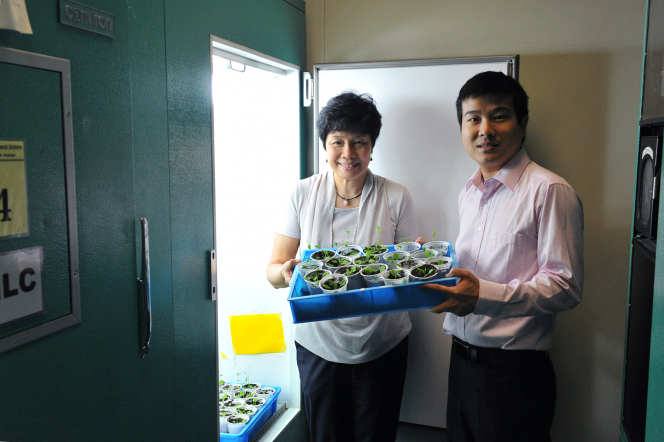Media
HKU identifies a new strategy to protect flowers from freezing stress
09 Jun 2014
A research project funded by the Wilson and Amelia Wong Endowment Fund at the School of Biological Sciences, Faculty of Science, the University of Hong Kong (HKU), has yielded a new strategy to protect flowers from freezing stress. An extension of this technology to crop plants is expected to benefit agriculture by protection of flowers against cold spells that kill flowers and adversely affect fruit and seed formation. Protection from freezing stress is especially relevant for citrus which suffers from revenue losses arising from freeze that often occurs in winter.
As fruits and seeds form the bulk of our harvests in agriculture, and humans and domesticated animals depend on them for food, an extension of this technology to food crops will ensure that flower development progresses to fruit and seed yield. This will no doubt improve food production in areas susceptible to freeze. Furthermore, if this technology were to protect cultivated blooms from freezing stress in floriculture, losses from low temperature stress in the floral industry can be reduced.
In this technology, the research group has identified a protein designated as ACYL-COA-BINDING PROTEIN6 (ACBP6) from the model plant, Arabidopsis thaliana, that when overexpressed in Arabidopsis confers protection of transgenic flowers against freezing treatment of -7 oC for one hour. While 54% of wild-type flowers remained intact after this low temperature treatment, 86% of the transgenic flowers survived the stress. ACBP6 is a lipid-binding protein that can bind phosphatidylcholine, an important component of membrane lipids, and their interaction conferred freezing-tolerance in ACBP6-overexpressing flowers.
This research led by Chye Mee Len, Wilson and Amelia Wong Professor in Plant Biotechnology from the School of Biological Sciences, with PhD students, Liao Pan and Chen Qinfang, has yielded a publication in Plant & Cell Physiology http://pcp.oxfordjournals.org/content/early/2014/02/19/pcp.pcu037 and US patent No 8,378,172.
Professor Chye said: “Finding ways to protect plants from environmental stress is an important research area given that plants form critical components in food webs and food chains on planet Earth”. She also reflected on how these findings align with HKU’s emerging strategic research theme “Earth as a Habitable Planet”, as well as the aspirations of Dr. Wilson and Mrs. Amelia Wong in the use of plant biotechnology to ensure the supply of food for a sustainable future.
For the powerpoint presentation, please click : www.cpao.hku.hk/media/BioSci_Freezing_Flowers_ppt.ppt
For details on the Wilson and Amelia Wong Professorship in Plant Biotechnology, please visit: http://www.daao.hku.hk/ephku/en/Professorship-Detail/27-Wilson-And-Amelia-Wong-Professorship-In-Plant-Biotechnology.html
Figure 1. Transformed Arabidopsis flower overexpressing ACBP6 (ACBP6-OE) shows intact petals (right) while the control succumbs to freezing stress (left).
For media enquiries, please contact HKU Communications & Public Affairs Office
Ms Trinni Choy, Assistant Director (Media) Tel: 2859 2606 / Email: pychoy@hku.hk or
Ms Rhea Leung, Manager (Media) Tel: 2857 8555 / Email: rhea.leung@hku.hk


